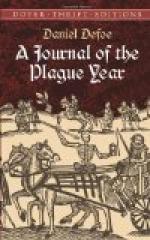And, indeed, the work of removing the dead bodies by carts was now grown so very odious and dangerous that it was complained of that the bearers did not take care to dear such houses where all the inhabitants were dead, but that sometimes the bodies lay several days unburied, till the neighbouring families were offended with the stench, and consequently infected; and this neglect of the officers was such that the churchwardens and constables were summoned to look after it, and even the justices of the Hamlets were obliged to venture their lives among them to quicken and encourage them, for innumerable of the bearers died of the distemper, infected by the bodies they were obliged to come so near. And had it not been that the number of poor people who wanted employment and wanted bread (as I have said before) was so great that necessity drove them to undertake anything and venture anything, they would never have found people to be employed. And then the bodies of the dead would have lain above ground, and have perished and rotted in a dreadful manner.
But the magistrates cannot be enough commended in this, that they kept such good order for the burying of the dead, that as fast as any of these they employed to carry off and bury the dead fell sick or died, as was many times the case, they immediately supplied the places with others, which, by reason of the great number of poor that was left out of business, as above, was not hard to do. This occasioned, that notwithstanding the infinite number of people which died and were sick, almost all together, yet they were always cleared away and carried off every night, so that it was never to be said of London that the living were not able to bury the dead.
As the desolation was greater during those terrible times, so the amazement of the people increased, and a thousand unaccountable things they would do in the violence of their fright, as others did the same in the agonies of their distemper, and this part was very affecting. Some went roaring and crying and wringing their hands along the street; some would go praying and lifting up their hands to heaven, calling upon God for mercy. I cannot say, indeed, whether this was not in their distraction, but, be it so, it was still an indication of a more serious mind, when they had the use of their senses, and was much better, even as it was, than the frightful yellings and cryings that every day, and especially in the evenings, were heard in some streets. I suppose the world has heard of the famous Solomon Eagle, an enthusiast. He, though not infected at all but in his head, went about denouncing of judgement upon the city in a frightful manner, sometimes quite naked, and with a pan of burning charcoal on his head. What he said, or pretended, indeed I could not learn.




